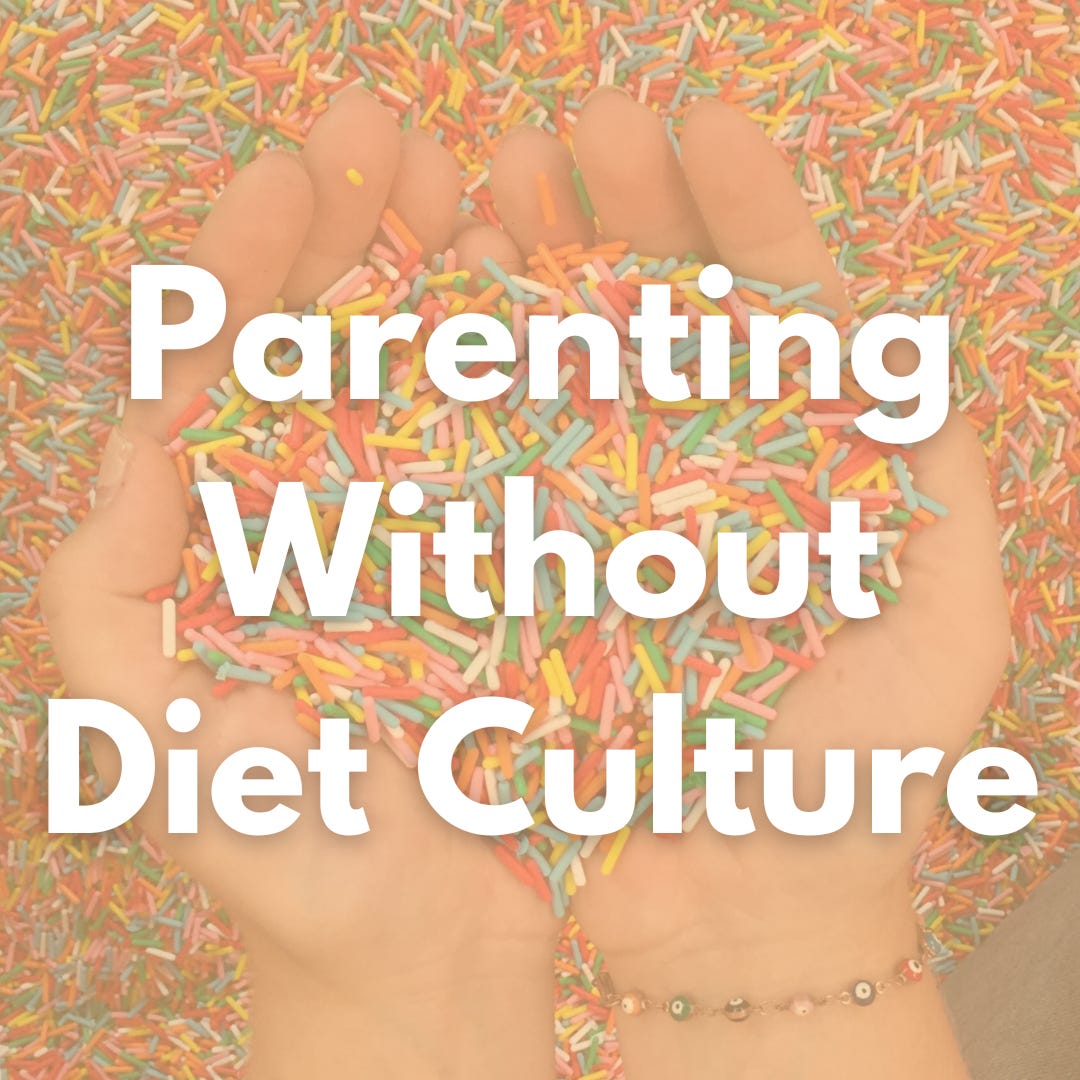Let’s talk about something I see and hear about way too often: parents locking up food like it’s the crown jewels. Snacks hidden away in top cabinets, pantries rigged like Fort Knox, literal padlocks on the fridge. And why? Because we’ve been told that our kids can’t be trusted around "bad" foods. That if given the chance, our sweet, innocent child will morph into a Dorito-devouring, cookie-crushing gremlin who’ll never stop eating.
Here’s the thing, part of the reason parents believe we can’t trust our kids around food is because we’ve been taught we can’t trust ourselves around food. Years of diet culture, food guilt, and “good” vs. “bad” food messaging have convinced us that if we let our guard down, we’ll spiral into uncontrollable eating. So naturally, we assume our kids will too.
I get it. As parents we want the best for our kids. We’re inundated with messages scaring us about food, body size and health. It’s overwhelming. But here’s the thing: locking up food doesn’t prevent kids from wanting it. It doesn’t make them crave vegetables.
What it does do is create a scarcity mindset—a mindset that fuels an unhealthy relationship with food, paving the way for guilt, shame, bingeing and possibly eating disorders.
The Science of Scarcity
When kids (or anyone for that matter) are deprived of certain foods, our brains don’t just go, “Oh well, I guess I didn’t want that cookie anyway. I’ll move on and never think about the cookie again.” No, our brains go into overdrive, fixating on the very thing they’re not allowed to have. It’s human nature. And when we finally do get access to the forbidden food (which we inevitably will), we don’t eat it like a normal, self-regulating person. We eat it with urgency, ignoring hunger/fullness cues and likely in secret, because who knows when we’ll get another chance? This is how bingeing starts with kids. Not because a kid lacks "self-control," but because their body and brain perceive food restriction as a threat.
Restriction isn’t just, “you can’t have this food ever.” It also looks like “you can only have it on special occasions,” “you can only have 1 or 2,” or “you have to eat it in here in front of me, while I hover over you with judgmental eyes.” The more a food is restricted, the more power it holds.
Doctors & Dietitians: Please Stop This Madness
Unfortunately, some of this nonsense starts with medical providers. Pediatricians, dietitians, and other well-meaning health professionals often tell parents to limit "junk food" to prevent weight gain. Some go so far as to suggest keeping it entirely out of the house or—my personal favorite—hiding it from their kids.
If a doctor told you that keeping your kid from learning about sex would prevent them from ever having it, you’d (hopefully) roll your eyes. And yet, we apply that same flawed logic to food. Teaching kids about food neutrality—how to enjoy all foods without guilt—would be a much more effective approach. But instead, we create food hierarchies rooted in shame and then act shocked when kids rebel against them.
If you’re a healthcare provider giving this advice, I need you to hear this: Encouraging food restriction doesn’t lead to healthier kids. It leads to kids who sneak food, feel ashamed of their bodies, and struggle with disordered eating later in life. That’s on us, not them.
What to Do Instead
If you’re a parent reading this and wondering if you’ve screwed up your kid’s relationship with food—take a breath. I want to offer you some self-compassion because you were doing the best you could with the tools you had in the moment. It’s not too late to make changes. It’s not too late for us to unlearn a restrictive mindset around food.
Here’s what actually helps:
Keep all different kinds of foods available. Yes, I mean all different kinds of foods. Cookies, carrots, nutella, hummus, otter pops, frozen fruit, pudding and yogurt to name a few. Making them available also means keeping them in plain sight, not hidden on the top shelf or behind other things, right out in the open for anyone to see.
Let kids eat those foods without commentary or restriction. No “just one,” no “you must eat your broccoli first.” Just let them be kids who eat. I know it’s hard not to say anything, but remember, we’re trying to help kids learn to trust themselves and their bodies around food.
Model a healthy, neutral attitude toward food and bodies. If you treat ice cream like a rare treasure, they will too. If you approach it with neutrality and without judgment, they’ll learn to, too. As parents, we must do our own work to unlearn diet culture. As we do that, our kids will notice.
If you’re reading this and thinking, ‘But if I do all those things they’ll never stop eating those foods.’ That might happen at first. But over time, we all habituate to food, and when we have full permission to eat all the foods, the scarcity mindset disappears. I know it sounds scary, but it works.
Food shouldn’t be a battleground. Kids should feel safe around food, not like they must smuggle a bag of chips out of the pantry like a criminal. And providers? Do better. The advice to “lock up the junk food” isn’t just outdated—it’s harmful. While you’re at it, stop calling it “junk food” too.
Let’s start raising kids who can have a cookie without it being a whole thing. Because at the end of the day, the cookie jar is not a Pandora’s box. It’s just a cookie jar.
Resources
Here are some great resources, including another couple Substacks to subscribe to learn more about helping you feed your kids.
Ellyn Satter - A great resource on how to help raise kids via her model for Eating Competence. She has many books, and I’ve used many of her philosophies in my house.
Fat Talk: Parenting in the Age of Diet Culture - This is a fantastic book by Virginia Sole-Smith. She also has a Substack which is excellent.
How to Raise an Intuitive Eater - An excellent book about how to apply Intuitive Eating Principles to your kids.
Parenting Without Diet Culture - This Substack by Ooan Hanson is such a good resource for all things related to kids, parents and how to navigate food and body issues without having diet culture influence you.






Reallly great article
Great article. Restriction was a huge component of my eating disorder. And it manifested in so many different ways. It has taken me a long time to come out of the scarcity mindset, and I would say that I'm still definitely working on it.